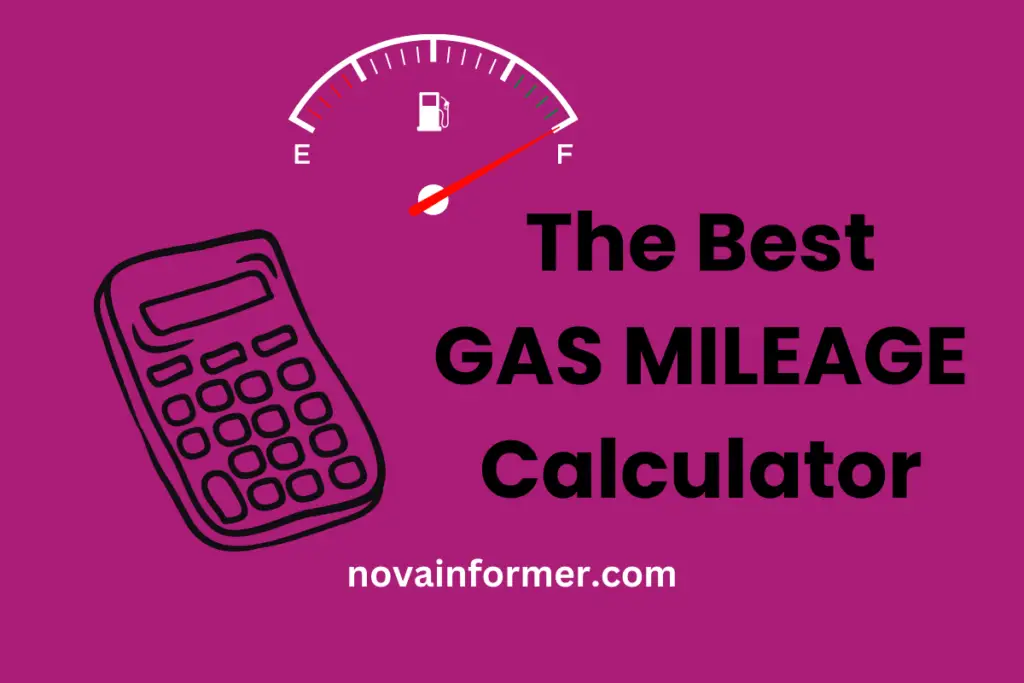Unlock fuel-saving secrets with the Gas Mileage Calculator. Drive smarter, save money, and go the extra mile.
-
Miles traveled:
{{main.totalMiles}} miles
-
Gas mileage:
{{main.mpg}} miles per gallon
-
Total spent:
{{main.fillExpense | currency}}
-
Cost per mile:
{{main.unitCost | currency}} per mile
Gas mileage—the unsung hero of our daily commute. We all love to hit the road, but wouldn’t it be great if our cars sipped fuel rather than guzzling it like a bottomless soda on a hot day?
Welcome to the world of gas mileage, where efficiency reigns supreme, and your wallet is the treasurer. 🚗💰 Let’s dive into the nuances of gas mileage and demystify the secrets behind that magical number displayed on your dashboard.
Key Takeaways
- Gas mileage is the distance your car can travel per unit of fuel, usually measured in miles per gallon (MPG).
- Improving gas mileage saves money and reduces your environmental footprint.
- Using a Gas Mileage Calculator helps you understand and optimize your vehicle’s fuel efficiency.
- Small changes in driving habits and regular maintenance can significantly boost gas mileage.
Gas Mileage Demystified
What is Gas Mileage?
Gas mileage, or fuel efficiency, measures how far your vehicle can travel on a specific amount of fuel. It’s the miles-per-gallon superhero, saving you from frequent visits to the gas station. The higher the MPG, the farther you go on each gallon of fuel, and the happier your bank account stays.
Factors Influencing Gas Mileage
Vehicle Type
Different cars have different appetites for fuel. Compact cars tend to be more fuel-efficient than larger counterparts like SUVs that gulp down gas like it’s a Friday night.
Driving Habits
Aggressive driving and rapid acceleration are the villains here. Smooth, steady driving is the hero that saves the day, conserving fuel and extending your gas mileage.
Maintenance Matters
A well-maintained car is an efficient car. Regular oil changes, proper tire inflation, and timely tune-ups keep your vehicle running smoothly and improve gas mileage.
Gas Mileage Calculator: Your Fuel-Saving Sidekick
Understanding the Gas Mileage Calculator
The Gas Mileage Calculator is like your car’s personal mathematician, crunching numbers to reveal your vehicle’s fuel efficiency.
It takes into account the miles traveled and the amount of fuel consumed, providing a precise MPG value. This nifty tool empowers you to make informed decisions about your driving habits and vehicle maintenance.
How to Use The Gas Mileage Calculator
Setting the Stage
So, you’ve got your eyes on that Gas Mileage Calculator, ready to unlock the secrets of your vehicle’s fuel efficiency. Buckle up, and let’s dive right in.
1. Current Odometer Reading
Navigate to the “Current Odometer Reading” section of the Gas Mileage Calculator. Input the current mileage displayed on your car’s odometer. It’s the number that tells your car’s life story in miles.
2. Previous Odometer Reading
Now, slide down to the “Previous Odometer Reading” section. Enter the mileage from your last adventure. This is where the calculator gets to do some math magic, calculating the distance traveled.
3. Gallons Added
Jump over to the “Gallons Added” section. Input the number of gallons you’ve added since your last fill-up. This is like telling the calculator how thirsty your car has been.
4. Price of Gas
Lastly, make your way to the “Price of Gas” section. Type in the cost per gallon of the precious fuel that keeps your car on the move. It’s the dollars and cents part of the equation.
The Magic Unveiled
As you fill in these details, like a wizard behind the curtain, the Gas Mileage Calculator will reveal the magic numbers that matter.
The Results: A Symphony of Efficiency
Now, feast your eyes on the results section:
- Miles Traveled: The distance covered by your trusty vehicle.
- Gas Mileage: The number of miles your car can devour on a single gallon.
- Total Spent: The monetary sacrifice you made to keep your car fueled.
- Cost per Mile: How much it costs you to travel a single mile.
One Last Tip
Always remember to hit the road with these numbers in mind. They are your secret weapons to conquering the gas mileage game. 🚗💨
Boosting Your Gas Mileage: Tips and Tricks
Lighten the Load
Just like a backpacker shedding unnecessary weight to conquer a mountain, a lighter car is more fuel-efficient. Remove unnecessary items from your trunk to improve gas mileage.
Smooth Operator
Be the smooth operator your car needs. Avoid aggressive driving, sudden accelerations, and abrupt stops. Consistent and moderate driving habits can significantly enhance your gas mileage.
Tire TLC
Keep those rubber companions properly inflated. Underinflated tires create more resistance, forcing your engine to work harder and guzzle more gas.
Routine Maintenance
Treat your car to regular check-ups. Dirty air filters and neglected tune-ups can lead to decreased efficiency. Show your car some love, and it will love you back with improved gas mileage.
Gas Mileage in Numbers
Let’s get down to the nitty-gritty with some cold, hard facts. Check out this table for a quick reference on the average gas mileage for different types of vehicles:
| Vehicle Type | Average Gas Mileage (MPG) |
|---|---|
| Sedan | 25-30 MPG |
| SUV | 15-20 MPG |
| Compact Car | 30-40 MPG |
| Hybrid/Electric Car | 40-50+ MPG |
Note: These figures are approximate and can vary based on specific makes and models.
Frequently Asked Questions
Can using premium fuel improve my gas mileage?
Using premium fuel doesn’t necessarily improve gas mileage unless your vehicle’s manufacturer recommends it. Stick to the fuel type recommended in your owner’s manual for optimal performance.
Do air conditioning and open windows affect gas mileage?
Yes, they do. Using air conditioning or driving with open windows can increase aerodynamic drag, reducing your gas mileage. Consider using them judiciously to save fuel.
How often should I change my air filter for better gas mileage?
Check your vehicle’s manual, but as a general rule of thumb, replacing the air filter every 12,000 to 15,000 miles can help maintain optimal engine performance and gas mileage.
Is idling bad for gas mileage?
Yes, idling consumes fuel without moving your car, resulting in poor gas mileage. If you anticipate being stationary for more than a minute, it’s more fuel-efficient to turn off your engine and restart when ready to move.
Can fuel additives improve gas mileage?
While some additives claim to boost gas mileage, their effectiveness is often debated. Stick to regular vehicle maintenance and fuel from reputable sources for optimal efficiency.
How can I improve gas mileage in winter?
In colder temperatures, it’s essential to warm up your car for a shorter duration to conserve fuel. Additionally, using winter tires designed for lower rolling resistance can help improve gas mileage.
Does the speed at which I drive impact gas mileage?
Yes, it does. Driving at higher speeds increases aerodynamic drag, leading to reduced gas mileage. Maintaining a moderate speed can contribute to better fuel efficiency.
Are electric vehicles more fuel-efficient than traditional cars?
Electric vehicles (EVs) are generally more energy-efficient and have higher MPGe (miles per gallon equivalent) than traditional gas-powered cars. However, charging habits and electricity sources can influence overall environmental impact.
In Conclusion
So there you have it—the lowdown on gas mileage and the magic behind those MPG numbers. Being a fuel efficiency wizard isn’t about casting spells; it’s about making smart choices.
From maintaining your car to embracing smooth driving habits, you’ve got the power to keep that gas gauge from hitting empty too soon. Happy and efficient driving! 🌟🚗
License:
by Krystal Klumpp (https://codepen.io/kklumpp13/pen/aNJgXR)



